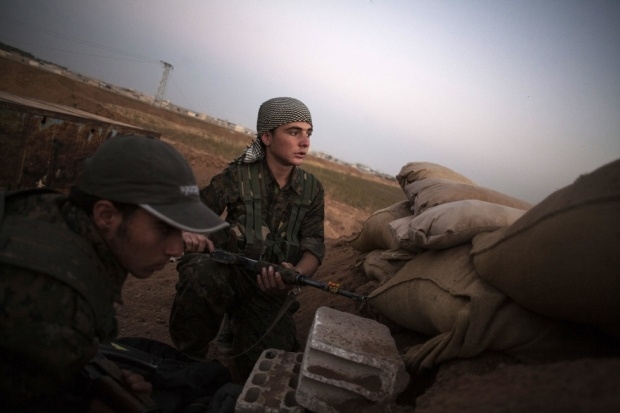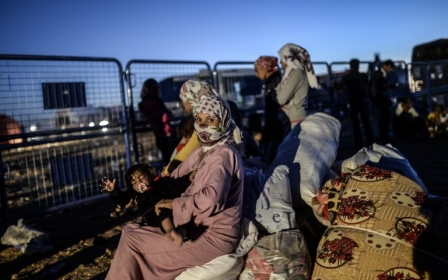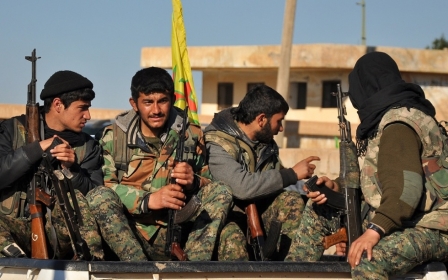YPG's greatest challenge: Kurdish-Arab relations in Syria

“In Raqqa and Tel Abyad, ISIS gives us Arabs security and belief in ourselves. They look after our interests,” Muhammad Alaaid, an Arab from Raqqa, explained. He is speaking to Middle East Eye in the Turkish city of Sanliurfa, close to the Syrian border. Muhammad speaks to his family regularly in Raqqa - the so-called capital of the Islamic State (IS) - and Tel Abyad, a city lying directly north of Raqqa on the Turkish border.
Tel Abyad is of crucial importance for two reasons. First, it is the main access point used by militants crossing from Turkey. Secondly, Tel Abyad remains the only city that stands in the way of uniting the Cezire canton to Kobane, a long-held goal of the Rojava administration. Rojava is a predominantly Kurdish area (divided into the three cantons of Cezire, Kobane and Afrin) which has been fighting for autonomy within Syria. Many of IS's attacks on Kobane were launched from Tel Abyad, and the Rojava administration believes that taking Tel Abyad is key to securing the safety of a liberated Kobane.
Displacement of Kurds
However, it is clear that the battle for Tel Abyad will not be an easy one. With the advance of IS, territories that are ethnically and religiously mixed are put through a process of “Sunnification” and “Arabisation”. When IS stormed into northern Iraq last year, it led to a mass exodus of Yezidis and Christians.
And Syria is no different. Before the Syrian war erupted, the city of Tel Abyad had a mix of Arabs, Kurds, Armenians and Turkmens. Thirty to 40 percent of the total population were Kurdish. But when IS seized control of the town in late 2013, Kurds fled to Turkey, Kobane and Serekaniye (a Syrian Kurdish town east of Tel Abyad).
“We felt threatened, and lots of friends of mine were killed,” said Ibrahim Muslim, a Kurd from Tel Abyad who served in the provincial opposition parliament in Raqqa before escaping from Syria in 2013. Ibrahim, who now lives in Sanliurfa, also expressed his desire to return: “Christians I know that fled IS don’t want to return. This I can understand. But we Kurds are different; our home is over there.”
Ibrahim went on to talk about the increased tensions between Kurds and Arabs, and accused Arabs of causing the misery inflicted on the Kurds. “The Arabs are to blame for the rise of IS. They took advantage of our displacement by seizing our homes and belongings when they joined the Islamic State.”
IS and bribes
Another Kurd from Tel Abyad, Baran Mustafa (not his real name), recently returned in search of his brother who had been imprisoned by IS. When Kurds were exuberant from their victory in Kobane two months ago, Baran’s brother had excitedly told a group of friends that the Kurdish group People’s Protection Units (YPG) would now advance quickly into Tel Abyad. The following day, he was arrested by IS in Tel Abyad and put in prison.
“My parents, who still live there, contacted me and told me to come and rescue him,” Baran told MEE. “Before I went,” he said, stroking his clean-shaven cheek, “I grew a beard to blend in.” Beards, he explained, were universal - barbers were no longer allowed to operate in Tel Abyad. “To go without a beard would have been crazy.”
Baran described two types of IS members: the local Arabs who joined after the group seized control of the town, and the foreign ones. “The foreign ISIS members are the real ISIS. They really believe in ISIS’s ideology and you don't want to cross paths with them. But for the locals, they are my old neighbours, we grew up together, so why would they want to arrest me?”
Baran negotiated the release of his brother through his local contacts. “I gave one of them 5,000 US dollars and told them to bring me my brother.” Such an arrangement was commonplace, and Baran described how many pay more: “ISIS generally demands $10,000 for Yezidi women prisoners.”
Why is IS popular?
In the war between IS and the Kurds much has been made of the stark ideological difference. But many of the refugees MEE spoke to believed the reason IS had so much support among the Arabs in Tel Abyad was more pragmatic than ideological. They have materially benefited from the displacement of Kurds.
Baran explains: “ISIS offers Arabs a level of comfort now the Kurds have fled, and for this reason they don't want us Kurds to return.” Fearful of the YPG encouraging displaced Kurds to return, many Arabs are now looking for IS to protect the gains they have made.
Alaaid, the man from Raqqa, wanted MEE to understand that “before the war Arabs and Kurds were like brothers. But now we are afraid of each other, we don't trust one another.” For Muhammad, the rise of YPG as a serious force in northern Syria was a threat. I asked if he believed YPG were stealing land, and he answered rhetorically: “If this was your room and others came and took it, would you accept it?” Muhammad had no doubt that the Arabs would defend IS against the advances of YPG.
Can the YPG overcome suspicion towards them?
The suspicion with which many Syrian Arabs look at the YPG is well documented. Arab opposition media outlets often mistranslate their name from “People’s Protection Units” to “The Protection Units of Kurds”. As their influence in northern Syria increases, so do suspicions of their separatist ambitions. However, Enver Muslim, the Prime Minister of Kobane canton, said that YPG, far from being separatist, were focused on implementing a federal model: “The localised autonomous system of Kobane represents a future model for the whole of Syria. We would like to see such a canton system replicated across the country.”
The Kurdish administration in the autonomous cantons has continuously placed emphasis on the protection it offers to minorities. In Cezire canton, Arab and Assyrian battalions form part of the YPG military force. Sheikh Humeydi Denhan, the leader of the Arab Shemmar tribe, is the co-president of the Democratic Union Party (PYD) in Cezire canton (the YPG is the PYD’s military wing). The Sheikh is an example of cooperation between Arab and Kurdish communities that the YPG hopes to build on.
'Sherwan Qasem, a humanitarian worker in Turkey, said: “The example of Sheikh Humeydi Denhan from the Shemmar clan is exactly the model the Kurds are looking to build on in Rojava. The problem is, for most Arabs, they are not buying it.”
While the YPG may not have fully gained the trust of Arab communities, the YPG have been careful not to increase tensions in the area. Between Tel Abyad and Serekaniye lie hundreds of Arab villages that were originally Kurdish. During the 1970s, the Assad regime pursued a policy of Arabisation on the Turkish border, essentially displacing Kurdish villagers. But instead of raiding the villages and returning them to the Kurds, the YPG have left them alone.
In a suburb of Sanliurfa, MEE visited a madrasa of Syrians run by a hospitable Kurd named Muhammad from the Syrian city of Haseke. The madrasa houses over 60 Syrians who have escaped the conflict. “The idea of this madrasa is to teach the true path of Islam. When we see young people being attracted to ISIS's path, we bring them here and show how ISIS has nothing to do with Islam,” Naksibendi explained. One of the new arrivals to this madrasa was an Arab imam from a village near the city of Qamishlo. Two months ago, IS entered his village, but when it became clear he wasn't going to pay lip service to the group, he was forced to flee to Turkey.
“For months, my village had been under YPG control. The Kurds didn't do anything to me, but as soon as ISIS came, it was Arabs who destroyed my home,” Naksibendi said. However, while keen to vent his anger towards IS, he was more hesitant about backing YPG. “My family will never fully support YPG. While I appreciate the security they have offered, many Arabs believe they don't represent us enough.”
Such reluctance to support the YPG is a challenge that the YPG need to overcome. But there is hope on the horizon. The Burkan al-Furat, a military coalition of YPG and various Arab forces - including the Arab Raqqa Rebels who fought alongside the YPG in the defence of Kobane - are part of the advance against IS. Such an alliance will be crucial in convincing Arabs that they are a legitimate force, and if successful, could become a blueprint of Kurdish-Arab cooperation in defeating IS. The challenge to convince the Arab citizens will certainly be a tall order, and in many ways, this is the greatest challenge facing the YPG if they are to successfully implement their project across Syria.
New MEE newsletter: Jerusalem Dispatch
Sign up to get the latest insights and analysis on Israel-Palestine, alongside Turkey Unpacked and other MEE newsletters
Middle East Eye delivers independent and unrivalled coverage and analysis of the Middle East, North Africa and beyond. To learn more about republishing this content and the associated fees, please fill out this form. More about MEE can be found here.




